The Journey Home by Sivashneel Sanjappa, shortlisted
 Sivashneel Sanjappa is a writer, chef and keen gardener originally from Fiji and currently based in Melbourne. He is currently working on his first novel. His work has been published previously in Verge literary journal. He can be found on Twitter @sivashneel and on Instagram @sivashneel.
Sivashneel Sanjappa is a writer, chef and keen gardener originally from Fiji and currently based in Melbourne. He is currently working on his first novel. His work has been published previously in Verge literary journal. He can be found on Twitter @sivashneel and on Instagram @sivashneel.
- Questions and Answers
For every impossible question that had floated up inside Roop’s thought bubble, there was a very real answer, if one cared to find out.
Was it Roop’s childhood kingfisher that had visited him that morning?
It was not.
Kingfishers don’t live that long. Roop’s childhood kingfisher died well before it could reach its natural lifespan. It died from a dynamite bomb that exploded while it had dipped into the ocean in search of its lunch. After it exploded, the fish died and floated up to the surface. The fisherman collected them and sold them at the Municipal Market that weekend. The kingfisher died and was carried to the beach by the incoming tide. It was lodged in the roots of a na-ivi tree, where it decomposed slowly. Weeks later, the ebbing tide took away its feathers and bones.
It had had three little eggs in its nest, tucked away in the thick of the tiritiri, the mangrove forest. They hatched shortly after it died. The hatchlings starved to death within hours of hatching. Over the years, the entire population of kingfishers in that tiritiri vanished. The Municipal Rubbish Dump on a nearby shore regularly sent an army of plastic bags, nylon sacks and such to the roots of the mangroves. The leachate from the growing pile of decomposing garbage seeped directly into the lagoon, where it travelled up the roots of the tiritiri and suffocated the mangrove trees. The kingfishers, along with the mudcrabs and the herons, either died or migrated to new homes.
The tiritiri that guarded the lagoon near Roop’s current village was intact, but for how long? The beach there had been leased to an overseas investor, who was planning to erect a new marina. Gossip went that he was planning to dredge up the entire lagoon, with the tiritiri, to make way for construction boats.
The kingfisher’s call may soon become a myth.
Did Roop’s butterfly survive its first flight?
It did indeed.
After it disappeared into the canopy of the rain trees in the Library Gardens, after Roop and Zarina went home that morning, it embarked on its life as a free butterfly. It fed on the nectar of many flowers. It fluttered over the tops of the trees, over to the gardens in the villages close by. It mated with many other butterflies. It laid many eggs and, at the end of its life cycle, died a natural death. It lived a short, fulfilled life.
Roop would have been happy to know this. Had he not released it from the jar that morning, it surely would have died a wretched, captive death.
Where did Tinisha, Mrs Murthi’s wedding hairdresser, disappear to?
Well, they fell in love.
One afternoon, a man named Manoj, a regular customer of Tinisha’s, came to the salon for his usual haircut. Tinisha’s heart beat a little faster around Manoj, as it always did. They flirted with each other in their usual, uneasy, secretive manner. Then, out of the blue, Manoj put his hand on Tinisha’s hip. Tinisha took his hand and led him to the back of their salon, behind a short wall.
Tinisha was a lucky point-five, perhaps the luckiest of all point-fives in Fiji. They experienced a first kiss, on the lips. The loving embrace of a strong man. They lay on top of Manoj for some time, caressing his bushy eyebrow, while the Sugar City dismantled itself at the end of the work day and people went home to have family dinners.
Tinisha and Manoj eloped to a small, distant village. Tinisha took him to their brother’s house, which had been vacant since he moved overseas six years ago. They lit a little fire in the backyard and walked around it seven times, thus marrying each other like Bollywood sweethearts. They lived a brief, blissful married life.
Two weeks later, two men came to the house with cane knives. One of them was Manoj’s tavale, his wife’s brother. Gossip had spread quickly, and because gossip was a more accurate source of information than any media channel, it wasn’t hard to track Manoj down. His tavale had come to take Manoj back to his wife and two children. To remind him of his responsibilities, to hold him accountable. To chastise him for the shame he had brought to their family. To set him back on track.
They beat Manoj up and took him away in a blue van. Before leaving, they locked Tinisha inside a clothes cupboard.
Tinisha spent a day figuring their way out of the cupboard. They managed to break it open from inside. They took a bus back to the Sugar City and waited outside Manoj’s workplace. When Manoj saw Tinisha, as he emerged at the bottom of the flight of stairs that led to his office, terror contorted his face into a grim mask. He pulled Tinisha aside. His forehead was bruised and he had a bandage around a finger. He told Tinisha he had moved on. He begged Tinisha to leave him alone. He asked them to move to Suva or somewhere and start a new life. Then he ran to the kerb and jumped in a taxi, which disappeared into the afternoon dust.
Tinisha, shaken, heartbroken, downtrodden, took their wig off and threw it in a public rubbish bin. They took the bus back to the house where they had got married. They stepped back into the cupboard they had fought their way out of earlier that day, and hung themself from the railing with a wire hanger.
Some weeks later, their body was found by a neighbour who couldn’t handle the stench from rotting corpse any longer. The police tried to contact Tinisha’s overseas brother, but to no avail. Tinisha was burnt in a public crematorium.
Gossip travelled around the country, like a Sunbeam Bus, that they had moved to Suva and opened a stylish new salon.
And, finally…where do bijuriyas go when they’re not dancing at weddings?
Where does lightning go after it has struck?
No one knows.
No one cares to find out.
However, as Roop put his brain to sleep late that night, Shilpa, the bijuriya, sat on a secluded beach a few villages away, gazing at a gibbous moon.
A couple of hours after Roop and Zarina had finished eating their BBQ and driven off, Shilpa had arrived at the Library Garden. They had taken their ghaangra off. They wore a short skirt and crop top. They had reapplied their lipstick, which glistened under the street lamp.
Two women in similar clothes stood at the edge of the garden, keeping an eye on passing cars. Shilpa asked them for a cigarette. One of them handed Shilpa a half-smoked Rothman’s cigarette.
A shiny Mitsubishi drove past and slowed down. The tinted windows were rolled down. Four sets of teeth appeared, floating, inside the van.
The back door opened and one of the passengers, a man, urged Shilpa in.
They were given a cold Fiji Bitter stubby. They sipped it quietly. The man next to them took their hand and slid it into his pants. They massaged the man’s crotch quietly. The man unzipped their fly and shoved Shilpa’s head into his crotch. He held their head down.
It stank.
Still, Shilpa serviced the man’s crotch.
The van drove out of the town, down a windy road, to a secluded beach. The men got out.
Shilpa adjusted their wig and got out of the van. They dropped to their knees, and serviced the four smelly dicks. One at a time, two at a time, three at a time.
They spat out each one’s ejaculate onto the sand.
One of the men, who had the unmistakable overseas aura about him, handed them a $20 note.
Shilpa kicked up a fuss. They demanded $20 for each smelly dick.
“We didnt even fuck you bitch,” they said, and drove off in their van.
“Saala maichod bhatiyara,” Shilpa shouted at the van. They threw a piece of dead coral at the van, but it missed. Shilpa sat on the beach, and watched the gibbous moon touching the ocean, ever so gently. The tide was out. The exposed tiritiri roots jutted into the sand like stiff, sedentary snakes. Little crabs crawled from one hole to another over the wet sand.
Shilpa felt angry, guilty. They hadn’t needed to be a whore that night, they had made enough cash at the wedding. Why had they taken to the street then? Maybe it was dancing in the lap of that beautiful boy with the piercing eyes and bulging eyeballs at the wedding. The force with which he had pushed her off. The disdain, the violence — it had aroused Shilpa, brought their point-five juices alive.
They waited for daylight to break, but fell asleep presently.
They were woken up by the prongs of a crab-spear poking their shoulder. A woman with a big afro like a halo and a charcoal-shined face was asking them if they were alright. The tide was flowing in, lapping at Shilpa’s feet.
“Isa, what you doing here?” the lady asked in Fijian. Shilpa replied, in broken Fijian, that they had been stranded there. The lady introduced herself as Siteri. She didn’t ask Shilpa for details. She invited Shilpa to her house.
It was a tiny tin house, surrounded by coconut trees. Siteri lived alone. She said her children lived near the town, and they visited her sometimes.
In the backyard, water was boiling in a big pot over a fire. Siteri fed more wood into the fire, then plunged the one crab she had speared earlier into the boiling water.
She rolled out a woven mat on the floor of her house. Shilpa sat down.
They drank tea and ate some boiled cassava.
Siteri said the tiritiri was dying. Back in the day, she said she would have filled her basket with crabs. She would have had enough to give some to her neighbours. Now the white vulagi who bought the beach wanted to dig it all up. She said the whole church was praying to God to save their village.
Shilpa asked Siteri about the charcoal. Siteri told her that it protected her skin from the sun.
When their clothes had dried up, Shilpa thanked Siteri and took their leave. They walked up the dusty road, following Siteri’s directions. They boarded a bus at the junction. The bus was empty, the bus driver didn’t charge them.
Later, around mid-morning, Shilpa arrived at the shack that she rented from a pimp. She shared the shack with two others. One was Julie, who had been forced to the street by her husband and then abandoned by him when he found himself a younger wife. The other girl wouldn’t tell them her name. She was Chinese, so Shilpa and Julie affectionately called her Ching. Ching barely spoke to anyone. She had been brought to Fiji on a student visa and given over to Shilpa’s pimp. The pimp said someone was coming to take Ching away soon, when her student visa expired.
Inside the shack, the bucket in the middle of the floor had filled up with the previous night’s rain (which had leaked in through a hole in the roof) and flowed out. The mattress was wet. Julie was snoring on one end. Ching wasn’t around.
Shilpa took their wig off and fell asleep on the wet mattress.
- The Much Needed Holiday
As Shilpa fell asleep, a few villages away, Roop sat up in his bed and stretched his arms. He cursed himself for waking up so late — he had probably missed the kingfisher’s call at dawn.
Other than the chickens scratching about on the lawn and the mynahs chirping up in the trees, the only other sound he could hear was the radio in the kitchen. An announcer was announcing funeral notices.
Mr and Mrs Murthi had gone to Sunday Service at the Big Church. Mrs Murthi left the radio on to ward off would-be burglars. She took this extra precaution even though Roop was the lightest of sleepers,
Roop flung his bedsheet off and went to the bathroom. He undressed and studied himself in the mirror. His stubble was overgrown and needed shaving. His unruly hair looked as though it was full of dust. As though dust would fall out if he shook his head.
Veins stood out in his thin arms. The hollows in his collar bones could hold a tablespoon of water each. His ribs were visible in his chest. The one thing he had retained from childhood was his small, round belly. He sucked it in and it disappeared. Then he exhaled and it was back, a little kangaroo pouch. Further down, his penis was limp. The foreskin was shrivelled and pointed slightly to the left. His balls hung heavily, as though gravity pulled them more forcefully than it did the rest of his body. Perhaps gravity was humiliating him for being a twenty-eight year old virgin.
His bum cheeks also hung low, like ripe pawpaws waiting to fall off a tree.
He turned the tap on and stood under the cold water for some time. Then he dressed and went to the kitchen to make a cup of tea. The radio announcer had finished with the funeral notices, and played a jolly Sunday morning song:
Khush rehne ko zaroori, kya hai bolo yaar?
Khushi toh milti hai jab, mile kisi ka pyaaaar
To be happy, what do we need friend?
Happiness comes when we someone loves us.
Roop sat down at the dining table with his cup of tea. Yesterday’s newspaper lay open on the table. It was turned to page 13.
TWO MEN IMPRISONED ON HOMOSEXUAL CHARGES, the headline read in bold print.
Roop read the article. An Australian man and a Fiji-Indian man had been found engaging in homosexual behaviour in a hotel room. The Australian homosexual had called the police after he found all his money missing after the Fiji-Indian homosexual made a run with it after their ‘encounter’. The police came and seized the Australian’s belongings. On his digital camera, they found the recording of the ‘disgusting acts’ the homosexuals had filmed. Both homosexuals were arrested and the court sentenced them to prison.
Fiji had been one of the first countries in the world to have a bill of rights that specifically illegalised discrimination based on sexual orientation. But still two homosexuals were in prison. They were charged for filming sex, that is producing pornography, which was illegal. Still, the article made it clear that the two homosexuals were disgusting. A Methodist Church pastor was quoted as saying that.
In a few days, the Australian homosexual would be released and fly back to his country. The Fiji-Indian homosexual would remain in prison. His wife would beg a garment factory owner for a job so she could look after her little son and daughter.
It wasn’t by coincidence that the newspaper came to be lying on the dining table, conveniently turned to page 13. Someone had left it there, for Roop to read. Roop had found a similar newspaper article when he had come home during uni break in 2000, some months after the May 2000 civilian coup.
That time, it had been about John Scott. He was a half-Fijian half-white man who grew up in New Zealand. He had returned to Fiji and worked as a volunteer, and eventually became the Director of the Red Cross. After the ministers in parliament were taken hostage and kept captive in the Parliament House, John Scott had been most active in taking provisions in for them, checking on their health. The country had been awed with his generosity, his bravery. That he risked his life for the hostages. Media channels had praised and applauded him.
Then, one night he had been discovered brutally murdered in his house. His young lover, a kiwi man had also been murdered. The post-mortem results confirmed that the two homosexuals had been subjected to vile torture before being hacked to death. But even before the post-mortem results were released, even before the accused murderer had appeared in court, a senior police officer had made official statements about the case. He said the accused, a young Fijian man, had been abused by John Scott. That John Scott had lured him away from his rugby career in high school with alcohol and drugs. It had mentally disturbed the accused and driven him to this vengeful act. Several months later, the accused was sent to a mental institution and not charged with murder. John Scott, once a generous and brave hero, bowed out of history as a disgusting, alcoholic, drug-addicted homosexual. His body, and his young lover’s body, were both taken to New Zealand by their families for proper funeral services.
Roop finished his tea, and threw the newspaper in the bin. He turned the stupid radio off. Zarina came and picked him up. They drove to Village 4 to see a film. She had been hoping to see Brokeback Mountain, for the rave reviews it had received. She said movie tickets in Melbourne cost 20 Australian dollars. In Fiji, they cost 5 Fijian dollars. Roop told her that Brokeback Mountain had played in the cinemas for exactly two days. Then members of the Methodist Church of Fiji had marched through the streets in protest, demanding the cinemas stop showing it. It was now banned in the country. Zarina was furious. “When will this country move on from these foolish things?” she asked.
They decided to watch the remake of Umrao Jaan.
In the thirty minutes they had to kill before the film started, Roop went to the Internet cafe next to the cinema and printed out the application forms for an Australian tourist visa from the Embassy Website.
~~~
 Jessie Tu’s poems and scripts have appeared in the Australian Book Review, FishFood Magazine and The Voices Project. Winner of 2016 Joseph Furphy Literary Prize in Poetry, she was shortlisted for the Peter Porter Poetry Prize in 2017. She is recently returned from a workshop in creative non-fiction writing at the Iowa Summer Writer’s Festival, University of Iowa. ‘Another Country’, an extract from her memoir-in-progress was shortlisted for the Deborah Cass Prize in 2017, judged by Alice Pung. Her poetry chapbook, You should have told me we have nothing left is forthcoming with Vagabond deciBels 3.
Jessie Tu’s poems and scripts have appeared in the Australian Book Review, FishFood Magazine and The Voices Project. Winner of 2016 Joseph Furphy Literary Prize in Poetry, she was shortlisted for the Peter Porter Poetry Prize in 2017. She is recently returned from a workshop in creative non-fiction writing at the Iowa Summer Writer’s Festival, University of Iowa. ‘Another Country’, an extract from her memoir-in-progress was shortlisted for the Deborah Cass Prize in 2017, judged by Alice Pung. Her poetry chapbook, You should have told me we have nothing left is forthcoming with Vagabond deciBels 3.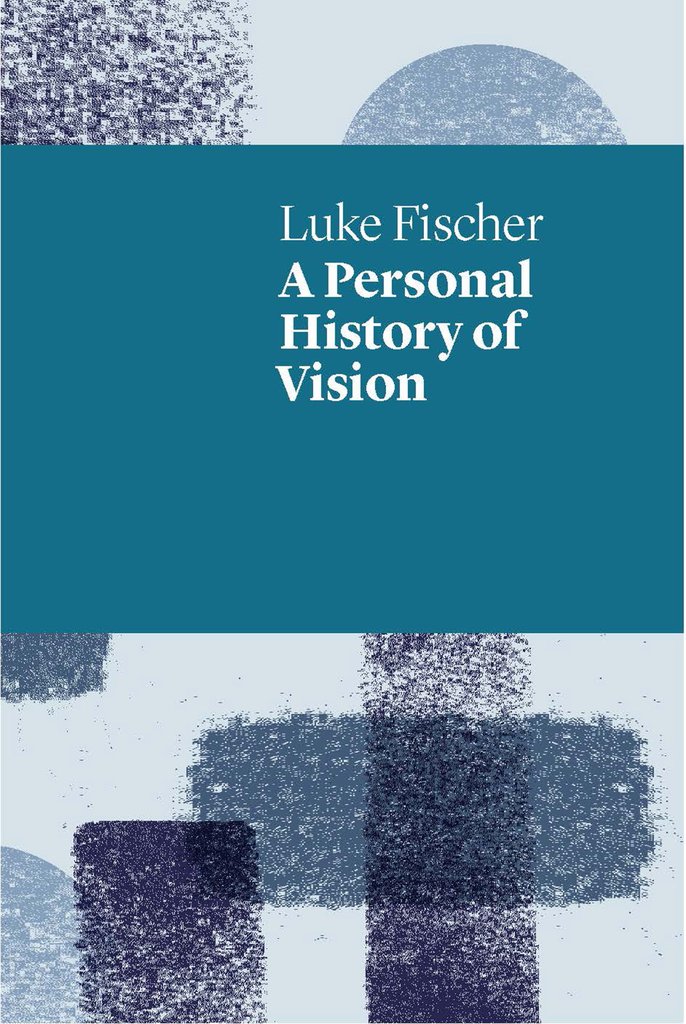 A Personal History of Vision
A Personal History of Vision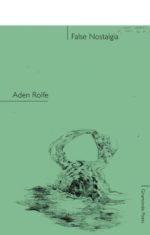 False Nostalgia
False Nostalgia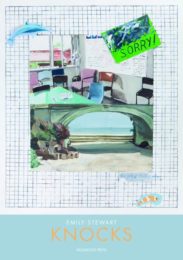 Knocks
Knocks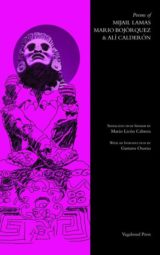 Poems of Mijail Lamas, Mario Bojórquez & Alí Calderón
Poems of Mijail Lamas, Mario Bojórquez & Alí Calderón Claire Potter ’s most recent poetry publications have appeared in The Fremantle Press Anthology of Western Australian Poetry (edited by John Kinsella and Tracy Ryan), Best Australian Poems 2016 (ed. Sarah Holland-Batt), Poetry Chicago (ed. Robert Adamson), and Poetry Review Ireland. She was shortlisted for a 2017 Keats-Shelley Poetry Prize UK and she has published three poetry collections, In Front of a Comma (Poets Union 2006), N’ombre (Vagabond 2007) and Swallow (Five Islands 2010). She lives in London.
Claire Potter ’s most recent poetry publications have appeared in The Fremantle Press Anthology of Western Australian Poetry (edited by John Kinsella and Tracy Ryan), Best Australian Poems 2016 (ed. Sarah Holland-Batt), Poetry Chicago (ed. Robert Adamson), and Poetry Review Ireland. She was shortlisted for a 2017 Keats-Shelley Poetry Prize UK and she has published three poetry collections, In Front of a Comma (Poets Union 2006), N’ombre (Vagabond 2007) and Swallow (Five Islands 2010). She lives in London.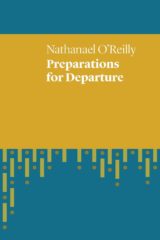 Preparations for Departure
Preparations for Departure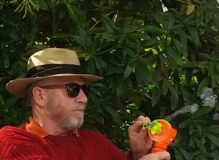 Mark O’Flynn’s most recent collection of poems is Shared Breath, (Hope Street Press, 2017). He has published a collection of short stories as well as four novels. His latest The Last Days of Ava Langdon (UQP, 2016) has been shortlisted for the 2017 Miles Franklin Award.
Mark O’Flynn’s most recent collection of poems is Shared Breath, (Hope Street Press, 2017). He has published a collection of short stories as well as four novels. His latest The Last Days of Ava Langdon (UQP, 2016) has been shortlisted for the 2017 Miles Franklin Award.